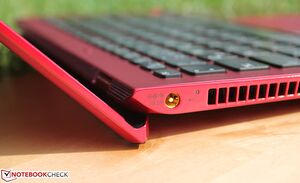Pro 13: Difference between revisions
More actions
Resident007 (talk | contribs) →Daily Usage Today: removed subjective stuff |
|||
| Line 27: | Line 27: | ||
This device is still very usable today. It can watch 1440p60 YouTube videos with minimal frame drops, and 1080p60 with no issues. The fast SSD makes for a very snappy experience overall, and it can run non-resource-intensive games at a reasonable frame rate. This comes at a cost, fan noise, as it can get pretty loud even on light loads, especially on the i7 models, however this can be mitigated slightly by undervolting using ThrottleStop. Ideally you would want the i5 with 8GB RAM, as it is quieter than the i7 yet also has enough RAM to be a good usable laptop today | This device is still very usable today. It can watch 1440p60 YouTube videos with minimal frame drops, and 1080p60 with no issues. The fast SSD makes for a very snappy experience overall, and it can run non-resource-intensive games at a reasonable frame rate. This comes at a cost, fan noise, as it can get pretty loud even on light loads, especially on the i7 models, however this can be mitigated slightly by undervolting using ThrottleStop. Ideally you would want the i5 with 8GB RAM, as it is quieter than the i7 yet also has enough RAM to be a good usable laptop today | ||
Windows 11 runs completely fine on this device, with all drivers and function keys working. | |||
== Downloads == | == Downloads == | ||
Revision as of 22:21, 1 August 2024

Overview
The Sony VAIO Pro 13 (SVP13) is a business-class ultrabook laptop computer that was released in 2013 by Sony. It is part of the last generation of VAIO laptops from Sony. An 11 inch version is also available (see Pro 11). The VAIO Pro series were the lightest 11- and 13-inch laptops in the world when announced.
The Pro 13 features a 4th Gen Haswell Intel Core i5 or i7 ULV processor, an Intel HD 4400 IGP, and 4GB or 8GB of RAM, which is soldered on the motherboard. There was three SSD options, a SATA 6GB/s Toshiba SSD for the 128GB version, and a Native PCIe XP941 Samsung SSD (not NVME) for the 256GB and 512GB versions, both of the M.2 NGFF form.

The case is made of flexible carbon fiber, which makes the laptop very light at only 1.066 kg (2.35 pounds). When the display is opened, the bottom half of the laptop gets slightly elevated, which makes for a more comfortable typing experience. It was available in black, silver and glossy red.
One of the selling points of this laptop other than its weight, is its display, a Sony Triluminos 1080p IPS panel with 10 finger multi touch support (non-touch models were available as an option as well).
Detailed Specs
Processor: Intel Core i5-4200U, i7-4500U or i7-4650U
Graphics: Intel HD Graphics 4400 or Intel HD Graphics 5000 (i7-4650U only)
RAM: 4GB or 8GB DDR3L-1600 (soldered)
Display: 13.3" 1920x1080, optional 10 finger multi touch support, IPS, glossy, panel: "Panasonic VVX13F009G00"
Storage: Samsung XP941 M.2 NGFF PCIe SSD (256/512GB models) or Toshiba M.2 NGFF SATA 6GB/s SSD (128GB models)
Weight: 1.066 kg / 37.6 oz / 2.35 pounds (with touchscreen) or 946g (without touchscreen)
Daily Usage Today
This device is still very usable today. It can watch 1440p60 YouTube videos with minimal frame drops, and 1080p60 with no issues. The fast SSD makes for a very snappy experience overall, and it can run non-resource-intensive games at a reasonable frame rate. This comes at a cost, fan noise, as it can get pretty loud even on light loads, especially on the i7 models, however this can be mitigated slightly by undervolting using ThrottleStop. Ideally you would want the i5 with 8GB RAM, as it is quieter than the i7 yet also has enough RAM to be a good usable laptop today
Windows 11 runs completely fine on this device, with all drivers and function keys working.
Downloads
Follow our guides to download and install drivers.
Recovery discs are not available for this model, however someone published some drivers.
Sources
NotebookCheck and Sony
